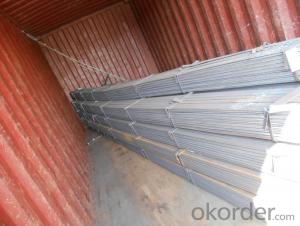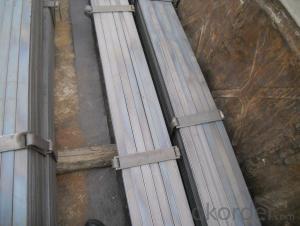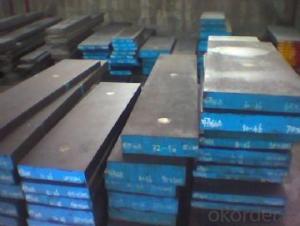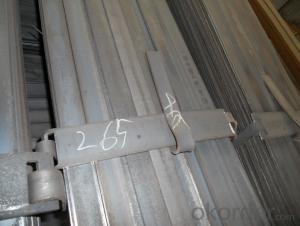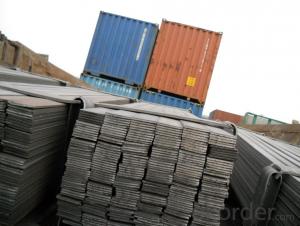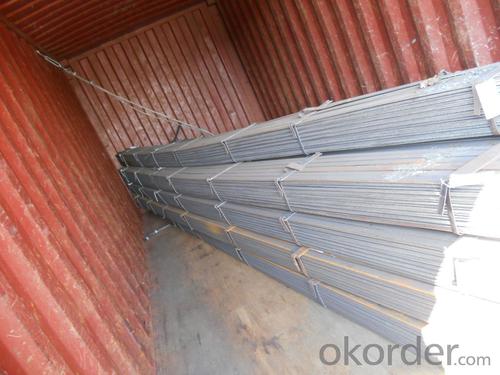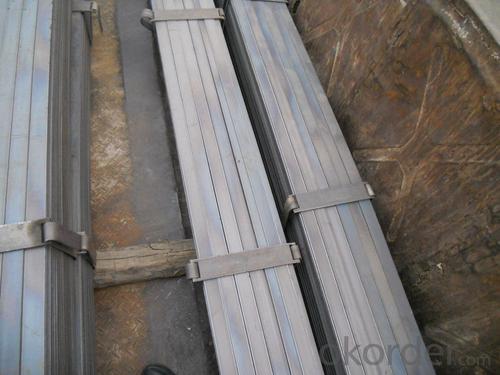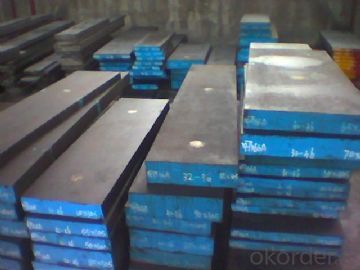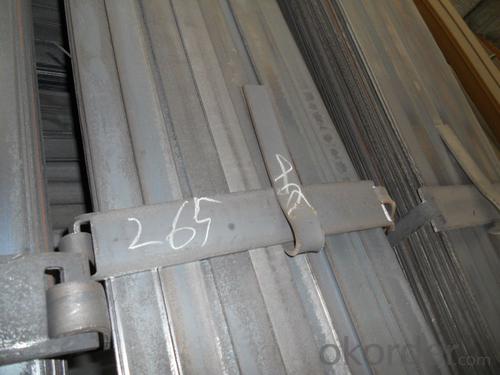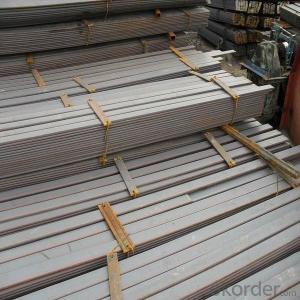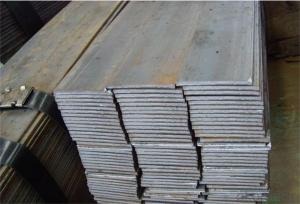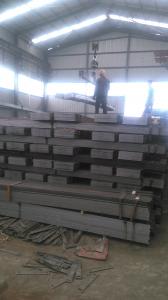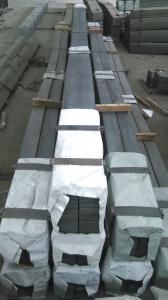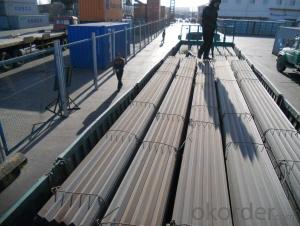Spring Steel Bar/billet/products JIS standard/Europe standard/ ASTM standard
- Loading Port:
- Shanghai
- Payment Terms:
- TT OR LC
- Min Order Qty:
- 20 m.t.
- Supply Capability:
- 1200 m.t./month
OKorder Service Pledge
OKorder Financial Service
You Might Also Like
Specifications
Spring steel flat bar
Garde: 60Si2Mn, 60Si2MnA, 55CrMnA,50CrVA
Standard GB,JIS,ASTM,DIN,AISI,BS
LF & VD forge;ISO&TUV appr
Materials
Q195,Q215,Q235B,Q345B,
S235JR/S235/S355JR/S355
SS440/SM400A/SM400B
Product Category
Metallurgy,Mineral &Energy
Technique
HOT ROLLED
Packing
1.Big OD:in bulk
2.Small OD:packed by steel strips
3.woven cloth with 7 slats
4.according to the requirements of customers
Usage
Mechanical&manufacture,Steel strcuture,
Shipbuilding,Bridging,Automobile chassis
Main market
Middle East,Africa, Asia and some Uropean country and America ,
Australia
Country of origin
China
Productivity
15000 Metric Tons pet Month
Remark
Payment terms :T/T ,L/C
Terms of trade :FOB ,CFR,CIF ,DDP,EXW
Minimum order : 10 tons
Lead time :on or before 3-15 working days .
- Q: How does the corrosion resistance of special steel compare to regular steel?
- The corrosion resistance of special steel is generally superior to regular steel. Special steel is specifically designed to have enhanced resistance against corrosion due to its composition and manufacturing process. It often contains higher levels of alloying elements such as chromium, nickel, and molybdenum, which form a protective layer on the surface of the steel, preventing it from reacting with corrosive substances. Regular steel, on the other hand, typically has a lower corrosion resistance due to its composition and lack of alloying elements. It is more prone to rusting and other forms of corrosion when exposed to moisture, atmospheric gases, or chemicals. Furthermore, special steels may undergo additional treatments such as heat treatment, passivation, or coating to further enhance their corrosion resistance. These treatments help create a barrier against corrosive agents, extending the lifespan and durability of the steel in corrosive environments. In summary, special steel offers superior corrosion resistance compared to regular steel due to its composition, alloying elements, and additional treatments. This makes it a preferred choice in applications where corrosion resistance is critical, such as in marine environments, chemical processing plants, or infrastructure exposed to harsh weather conditions.
- Q: What are the properties of corrosion-resistant tool steel?
- Corrosion-resistant tool steel possesses a combination of properties that make it resistant to corrosion. These properties include high levels of chromium, which forms a protective oxide layer on the surface of the steel, preventing the penetration of corrosive substances. Additionally, corrosion-resistant tool steel often contains other alloying elements such as molybdenum, vanadium, and tungsten, which further enhance its resistance to corrosion. This type of steel also exhibits high hardness, strength, and wear resistance, making it suitable for use in various tools and applications where corrosion resistance is crucial.
- Q: What are the safety benefits of using special steel?
- Using special steel can provide several safety benefits in various applications. One of the main advantages is its enhanced strength and durability compared to traditional steel. Special steel is often designed to withstand extreme conditions, such as high temperatures or corrosive environments, making it ideal for applications in industries like aerospace, automotive, and oil and gas. The high strength of special steel allows for the construction of safer and more reliable structures. It can withstand heavy loads, reducing the risk of structural failures or collapses. This is crucial in industries where the safety of workers, equipment, and the general public is of utmost importance. Another safety benefit of special steel is its resistance to corrosion. Corrosion can weaken structures and compromise their safety. Special steel is often alloyed with elements like chromium, nickel, or molybdenum, which provide excellent corrosion resistance. This makes it suitable for applications in marine environments, chemical processing plants, or any setting where exposure to moisture or chemicals is a concern. Special steel is also known for its ability to retain its mechanical properties at high temperatures. This makes it an excellent choice for applications where heat resistance is crucial, such as in the construction of fire-resistant structures or in the manufacturing of industrial ovens and furnaces. By using special steel in these applications, the risk of structural failure or fire-related accidents can be significantly reduced. Furthermore, special steel can offer improved fatigue resistance, which is important in applications subject to cyclic loading or vibration. Fatigue failure can occur when a material experiences repeated stress over time, leading to cracks and eventual failure. Special steel can be engineered to have excellent fatigue properties, reducing the likelihood of unexpected failures and improving the overall safety of structures or equipment. In summary, the safety benefits of using special steel include enhanced strength, durability, corrosion resistance, heat resistance, and fatigue resistance. These properties make special steel a reliable choice for industries where safety is a top priority, ensuring the protection of workers, equipment, and the general public.
- Q: How is special steel recycled?
- Special steel can be recycled through a process called electric arc furnace (EAF) recycling. In this method, the steel scrap is melted in an electric arc furnace, where impurities are removed and alloying elements are added to obtain the desired composition. The molten steel is then cast into new shapes or used to produce various steel products. This recycling process helps to conserve resources, reduce energy consumption, and minimize waste in the steel industry.
- Q: Can special steel be used in the semiconductor manufacturing industry?
- Yes, special steel can be used in the semiconductor manufacturing industry. Special steel alloys, such as stainless steel and tool steel, are often used in the construction of semiconductor equipment and components. These steels are chosen for their high strength, corrosion resistance, and thermal stability, which are essential properties for withstanding the harsh environments and processes involved in semiconductor manufacturing. Additionally, special steel can be engineered to have low levels of contamination, making it suitable for applications where purity is crucial, such as in cleanroom environments.
- Q: How does special steel contribute to the renewable energy conversion efficiency?
- Special steel plays a crucial role in improving the renewable energy conversion efficiency by offering enhanced mechanical properties, corrosion resistance, and temperature resistance. It is used in the manufacturing of various renewable energy components such as wind turbine blades, solar panels, and hydroelectric power systems. The strength and durability of special steel ensure that these components can withstand harsh environmental conditions, resulting in increased efficiency, reliability, and lifespan. Additionally, special steel's high thermal conductivity allows for efficient heat transfer in concentrated solar power plants, further optimizing energy conversion.
- Q: Can special steel be used in power generation applications?
- Indeed, power generation applications can certainly benefit from the utilization of special steel. When we mention special steel, we are referring to a diverse range of steel types that have been specifically engineered to possess superior attributes like high strength, durability, heat resistance, corrosion resistance, and wear resistance. These exceptional properties make special steel an ideal choice for power generation applications where the materials must endure elevated temperatures, pressures, and mechanical strains. Within the realm of power generation, various components and equipment can make use of special steel. Examples include turbine blades, boiler tubes, heat exchangers, steam pipes, and high-pressure valves. To illustrate, thermal power plants, which rely on fossil fuels for electricity generation, often employ special steel in boiler tubes and heat exchangers to withstand the demanding conditions of steam generation, characterized by high temperatures and pressures. Moreover, in the context of nuclear power plants, special steel finds application in critical components such as reactor vessels, steam generators, and fuel cladding. This is due to its exceptional strength, resistance to radiation damage, and resistance to corrosion. Furthermore, the use of special steel extends to renewable energy power generation applications. For instance, in wind turbines, special steel is employed in the construction of turbine towers, rotor blades, and gearboxes. Its purpose is to withstand the challenges of high wind speeds, vibrations, and fatigue. In summary, special steel occupies a vital role in power generation applications, thanks to its extraordinary properties. By ensuring the reliability, efficiency, and longevity of the equipment and components employed in diverse power generation systems, special steel contributes significantly to the field.
- Q: How is maraging steel used in the production of rocket and missile components?
- Maraging steel is used in the production of rocket and missile components due to its exceptional strength, toughness, and resistance to heat and corrosion. Its unique properties make it ideal for critical parts like rocket casings, engine components, and missile guidance systems, where high performance and reliability are paramount. The steel's ability to handle extreme conditions, such as high pressures and temperatures, ensures that these components can withstand the rigorous demands of aerospace applications.
- Q: What are the main applications of special steel in the chemical industry?
- Special steel is widely used in the chemical industry due to its excellent properties such as corrosion resistance, high temperature resistance, and strength. It is primarily used in the construction of chemical processing equipment, including reactors, pipes, valves, and storage tanks. Special steel ensures the safe and efficient handling of corrosive chemicals, as well as the prevention of leaks and contamination. Additionally, it is utilized in the production of catalysts, which play a crucial role in various chemical reactions. Overall, special steel enables the chemical industry to maintain high product quality, operational efficiency, and safety standards.
- Q: What is the difference between stainless steel and special steel?
- Stainless steel is a type of steel that contains a high amount of chromium, which makes it resistant to corrosion and staining. On the other hand, special steel refers to a wide range of alloys that are specifically designed to have unique properties, such as high strength, heat resistance, or electrical conductivity. While stainless steel is primarily used for its corrosion resistance, special steel is tailored to meet specific requirements in various industries, such as aerospace, automotive, or construction.
Send your message to us
Spring Steel Bar/billet/products JIS standard/Europe standard/ ASTM standard
- Loading Port:
- Shanghai
- Payment Terms:
- TT OR LC
- Min Order Qty:
- 20 m.t.
- Supply Capability:
- 1200 m.t./month
OKorder Service Pledge
OKorder Financial Service
Similar products
Hot products
Hot Searches
Related keywords
